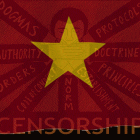7 Sep 2012 | Africa, Sub-Saharan Africa
South Africa’s parliament is in its final stages of reviewing a bill that, if passed, could have severe implications for press freedom in the country and the African continent. The Protection of State Information Bill (also known as the Secrecy Bill) could result in the imprisonment of journalists and whistleblowers who possess, publish or leak state secrets for up to 25 years.
(more…)
6 Sep 2012 | Asia and Pacific, News and features
 Dissent has suffered a crackdown in Vietnam in recent years, with bloggers often being the main target. Geoffrey Cain asks what has prompted this backlash against free speech (more…)
Dissent has suffered a crackdown in Vietnam in recent years, with bloggers often being the main target. Geoffrey Cain asks what has prompted this backlash against free speech (more…)
15 Aug 2012 | Uncategorized
Among the many issues concerning freedom of expression, it becomes easy to forget illiteracy, even though it serves as one of the most basic barriers to freedom of expression. Illiteracy limits the ability to access and receive information as well as to share and pass on information in written form — on — or offline. As such it is a block to participation in social and political life including writing on or engaging with a range of issues and debates. UNESCO in 2008 reported that 796 million adults worldwide are unable to read and write — an 8 per cent increase in literacy globally in the past 20 years. In 1995 the UN Special Rapporteur on the Right to Freedom of Opinion and Expression said “the right to seek or have access to information is one of the most essential elements of freedom of speech and expression”.
Of the 796 million illiterate adults, 64 per cent of them are women, which not only reflects a deficiency in gender equality, but also reflects how in some cases lack of access can be a part of restricting the rights of women. According to UNHCHR resolution 2003/42, higher illiteracy rates can be a part of keeping them from being able to freely communicate, and contributes to constraining their rights to freedom of expression.
While a hindrance to freedom of expression, a high literacy rate does not necessarily correlate with a democratic and free society. While UNESCO estimates China’s literacy rate to be 94 per cent in adults, the single-party state is notorious for its extreme censorship of both the internet and the press, and has earned a ranking of “not free” from the US-based organisation Freedom House this year. Democratic India, meanwhile has a literacy rate of 62.8 per cent in adults.
Illiteracy is not only a problem in developing countries, but also an ongoing obstacle in developed nations. In 2010, the Literacy Trust estimated that 1 in 6 adults in the UK is illiterate. In the United States, the US Education Department released a 2009 report stating that 32 million American adults are practically illiterate — struggling with even the most basic of literacy skills. Lower literacy means less citizens engaged with major debates within a state, or even access to basic information.
Such shocking numbers only mean that a significant portion of the populations of both the United States and United Kingdom are unable to adequately access information about issues, making it difficult to be an informed decision maker — something crucial for every member of a democratic society.
Sara Yasin is an Editorial Assistant at Index on Censorship
14 Aug 2012 | Asia and Pacific, Digital Freedom, News and features
 The world’s largest democracy is all too willing to censor the web, says Marta Cooper
The world’s largest democracy is all too willing to censor the web, says Marta Cooper
(more…)


